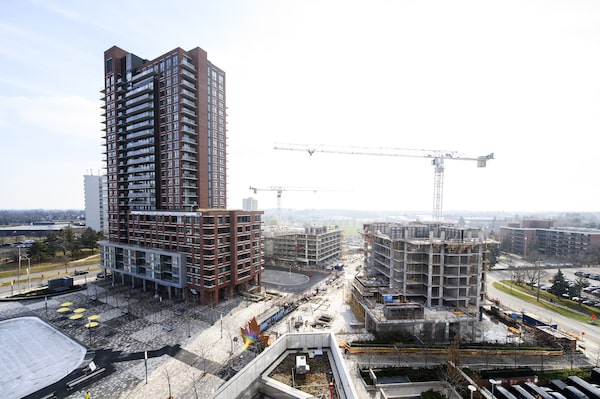
Condo construction is shown in Ajax, Ont., on Nov. 30, 2023.Christopher Katsarov/The Canadian Press
New condo sales in the Toronto region dropped to their lowest level since the 2009 financial crisis, with investors balking at lofty purchase prices and higher borrowing costs.
The slowdown has imperilled the construction of homes at a time when governments are trying to spur more building in a bid to make housing more affordable. The cost of housing is out of reach for many Canadian residents with the average monthly rent around $2,000 and the typical home selling for more than $700,000. The pace of home building needs to accelerate to meet the demand of a growing population. But the staggering drop in new condo sales will lead to less investment in housing.
There were 1,461 new condo sales in the Greater Toronto and Hamilton Area in the first quarter of the year, according to industry research firm Urbanation Inc. That marked the lowest quarterly amount since early 2009, when the world was reeling from the U.S. housing meltdown and global recession.
“It is dead. I would never use words like this, but I am because it is true,” said Simeon Papailias, managing partner with real estate brokerage REC Canada, whose firm sells new condos, also known as preconstruction condos because they have not been built yet.
Mr. Papailias said the industry used to handle an average of 300 preconstruction sales a day. So far this year, there has been an average of 500 preconstruction sales per month.
The preconstruction condo market started to falter in 2022 as the Bank of Canada raised interest rates to cool inflation. Preconstruction buyers do not take out a mortgage until their condo unit is built and that process can take several years. However, they still need to show developers up front that they can qualify for a loan when the condo building has been completed.
And it’s not just the high borrowing costs. New condo prices have been climbing as developers face higher construction costs. Although prices declined incrementally from the fourth quarter of 2023 to the first quarter of this year, some downtown Toronto projects have been selling for a minimum of $1,800 per square foot. That means a 500-square-foot studio would cost $900,000. That is unattractive for prospective homeowners who plan to live in their condo, as well as for investors, who make up the bulk of the preconstruction purchases.
Buyers can find cheaper and larger condos that have already been built. “Existing square footage is so much cheaper. The builders and their future pricing is a huge issue,” said Tuli Parubets, a mortgage agent with Mortgage Scout who works with homebuyers in the Toronto region.
Investors would have to charge more than the going market rental rate to cover their mortgage and other condo-related costs. “It’s very difficult for investors to make the numbers work on buying new condos, given their record-high price premium over resales and steeply negative cash flow on rentals,” Urbanation president Shaun Hildebrand said.
Pierre Carapetian, who has sold real estate in the Toronto region for 18 years, said he has steered his clients away from preconstruction homes into the resale market because resale homes are cheaper.
“In the last two years, I have not recommended a single project,” said Mr. Carapetian, who runs his own real estate brokerage. “I could not in good conscience recommend anything at this juncture because it makes no logical sense.”
As a result, demand has crumbled and developers have put projects on hold. Urbanation said since the market started slowing in 2022, it has counted five dozen projects that have been put on hold indefinitely. That accounts for 21,505 condo units.
For projects that have been launched, the weak pace of sales is affecting their ability to get financing to start construction. During the first quarter, projects in the preconstruction phase were only 50 per cent sold, on average. That compared with an average of 61 per cent in the first quarter of 2023, and an average of 85 per cent in 2022.
Lenders typically require developers to sell 70 per cent of their units for construction financing. The longer it takes to sell preconstruction condos, the longer it will take to get financing and start construction. That will eventually lead to fewer homes being built.
“No launches, no sales and no starts,” Mr. Papailias said. “It’s absolutely the most vicious cycle.”
The slowdown is occurring as governments try to make it easier for real estate developers to build. The federal government recently announced that it will allow first-time homebuyers to take out a 30-year mortgage for a preconstruction home if they make a deposit that is less than 20 per cent of the home’s purchase price and they pay for mortgage insurance. The old mortgage rules did not allow insured-mortgage borrowers to take out a loan longer than 25 years.
However, given that Toronto region developers typically require a 20-per-cent deposit, the longer amortization is not expected to make a big difference in the new-home market.
Editor’s note: An earlier version incorrectly stated that Simeon Papailias said his firm used to handle an average of 300 preconstruction sales a day.